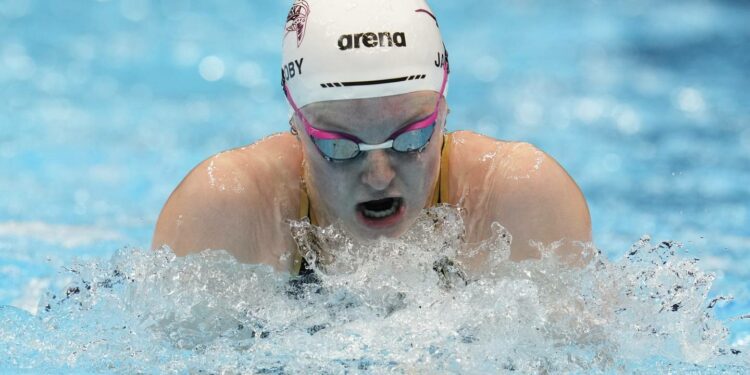Heading into the Olympic Trials for the 2024 Summer Olympic Games, it was widely assumed that Lydia Jacoby, the Seward swimmer who shocked the world as a teenager at the Tokyo Games in 2021, would advance to defend her gold medal in the women’s 100-meter breaststroke.
When she didn’t make the team that would travel to Paris, after she finished third in the finals of the Olympic qualifying race in June, Jacoby said she felt “devastation.”
But in many ways, that result has given Jacoby an extra dose of motivation, and has also put into perspective her past achievements and future opportunities.
“I think I’ve handled it really well, but watching (the) opening ceremonies and watching swimming has not been easy at all,” she said. “It was kind of a foregone conclusion that I would make it.”
Jacoby, now 20, said she’d long thought the Paris Olympics would be where she’d have the biggest opportunity to shine. But then she made the team for the Tokyo Olympics, in large part because the COVID-19 pandemic pushed those Games from 2020 to 2021, giving her another year to mature and improve in the pool.
“I had been gearing up for this Olympics the last three years or so,” Jacoby said. “Honestly, even as a kid, I never really thought I’d make the Tokyo Olympics. I was supposed to be 16 at that point, but I was 17 and did really well.”
Missing the Paris Games changed Jacoby’s plans for the summer. Instead of training and competing, she’s been focusing her energy elsewhere.
“To not be there is pretty heartbreaking, but I think it has also been a good way for me to focus on some other important things in my life, spend some time with family, reconnect with people,” Jacoby said. “It’s definitely been hard, but I think I’ve been handling it as well as I can.”
Even though she wasn’t there in person and competing, Jacoby still cheered on and supported her fellow Olympians who did.
“Swimming wise, it’s been really fun to watch (1500 meter gold medalist) Bobby Finke have probably the (best) performance of the meet,” she said. “(Triple gold medalist) Torri Huske was way up there as well.”
Becoming an advocate for mental health![]()
The Olympic Trials came on the heels of Jacoby being featured on a podcast series called “My New Favorite Olympian,” where she talked about her struggles with depression following the Tokyo Olympics. She joins a growing number of athletes who have talked about mental health struggles, something that even a decade ago was a rarity.
“I think it is great that people are discussing it more now,” she said. “It’s become more normalized and people do feel like they can talk about it.”
With high-profile athletes discussing their personal experiences, Jacoby said it’s important to realize how wide-ranging and evolving mental health issues can be for each individual.
“They are all different and need to be treated differently,” she said. “I do think discussions about mental health are to a point that it does need to be taken back a little bit so people realize that it’s not a category, it’s a fluctuation. It’s going to be different every day and it’s going to feel different every day.”
Jacoby firmly believes that it’s a “process and journey, not a categorization,” but also thinks that the national conversation surrounding mental health has become a two-edged sword.
“It’s great that there is so much discussion about it, but I also feel like people should be able to form their own journeys around mental health while continuing those discussions that we’ve opened up,” she said.
Her own mental health journey didn’t begin until after she reached a lifelong goal at the pinnacle of her sport.
“Before the Olympics, I had never really struggled with any mental health issues, but a few months after, I just started having a hard time doing things,” Jacoby said.
It was then that she realized that was suffering from depression, and she reached out for help and began working with a therapist shortly thereafter.
“It’s definitely been a journey and every day is different, but we just use the tools that we are given to learn how to deal with it,” Jacoby said.
Having healthy outlets and escapes from the grind is instrumental for anyone suffering from or struggling with mental health. For Jacoby, aside from therapy, she finds solace in journaling.
“I travel a lot, so much that it’s hard to consistently see a therapist, so it’s nice to have an outlet to write down your thoughts and just get them out on a page,” she said.
Part of Jacoby’s struggle included burnout, a pattern that young athletes often encounter.
“It’s important to diversify your hobbies and interests so that if you start feeling a little burnt out on one thing, you’ll have something else to turn to and direct more focus on for a while,” she said.
Jacoby’s No. 1 mental health tool is simply doing something to make herself feel good every day, even if it is something as small as getting a coffee, spending time with a friend or calling her mom.
Although she felt a lot of disappointment from missing this year’s Olympics, it was another opportunity for Jacoby to continue to work toward overcoming setbacks.
“I’ve had so many experiences that I would not have had otherwise, and I feel like I’ve grown a lot as a person both in the pool and out of the pool,” she said.
Pros and cons of a meteoric rise to fame
Going from a small-town girl to a global star was an experience Jacoby described as “definitely weird” but, in many ways, also “absolutely amazing.”
“I have met so many people that I wouldn’t have met otherwise, I’ve made some amazing connections and that’s what it is all about, the people, for me,” she said. “I’ve got to go places and travel the world.”
Some of the places she has enjoyed the most include Budapest, Hungary; Barcelona, Spain; France; and Monaco. She even got anairplane tattoo on her wrist in 2022 after visiting Mexico, the 10th country since the Olympics.
“Swimming has really allowed me to explore a lot of places that I wouldn’t have ended up in, so it’s been really neat in that way,” Jacoby said.
Being a 17-year-old on an Olympic team made her have to grow up a little quicker than most her age because she had to conduct herself like a professional.
“I feel like I definitely missed out on some kid activities that I would normally do as a kid, but there is always time for that,” Jacoby said.
The first couple of years living with heightened expectations from others was really difficult on her because she was “hyper focused” on living up to them. But more recently, she has been swimming for herself and those close to her.
“People always tell you to do something for something bigger than yourself, whether that is a sport or anything else in life,” Jacoby said. “But at the end of the day, if you’re not doing it for yourself, you’re not going to be able to do it. Bringing it back to that has been my way of thinking these last couple of years.”
Finding an identity and interests outside of athletics
Jacoby loves fashion and is majoring in textiles at the University of Texas at Austin, where she competes collegiately. The rising junior is sponsored by Arena, which she worked with to design three swimsuit collections.
“It’s been so fun getting to work with their product team and learning more about the creative process within sportswear,” she said.
Last year, she attended the Glamour Woman of the Year Awards, where she connected with even more people in the fashion industry.
This year, she will get to live out one of her childhood dreams by attending New York Fashion Week.
“I’ve dreamt of it since I was really little, just to be there for that,” Jacoby said. “I’m excited and it’s a really fun thing.”
It’s likely that fashion will be a big part of her future career pursuits once she feels like she’s accomplished all she can as a swimmer.
“I’m not going to be able to swim like this forever, so it’s important to build my life outside the pool so that it’s not such a culture shock when I do make that transition eventually,” she said.
Sights set on 2028
Since the Olympic Trials, she has taken a little break from swimming and she’ll get back into it when the time is right.
Jacoby’s winning time of one minute, 4.95 seconds in Tokyo was faster than the Paris Games’ gold-medal time of 1:05.28 posted by South African Tatjana Smith.
That served as greater motivation for Jacoby to get back to the big stage and show the world what she is made of once more.
To Jacoby, qualifying for the 2028 Olympics would be even more special because it will take place on American soil in Los Angeles.
“That’d be such a cool Olympics to attend, hosting at home with Team USA,” she said.
Her advice to any young Alaskan who aspires to reach great heights in any arena coming out of the Last Frontier, where exposure can be hard to come by, is to “lean on the people around you.”
“The biggest thing is to find a support system of people who believe in you just as much or more than you believe in yourself and just lean on those people,” Jacoby said. “At the end of the day, no matter where you are, how many resources you have or how many things you feel like are going the right way for you, if you don’t have the right people around you, it’s not going to happen.”
If you or someone you know is dealing with a mental health crisis, you can call the 24/7 Alaska Careline at 988 or 1-877-266-HELP at any time.
Source link : http://www.bing.com/news/apiclick.aspx?ref=FexRss&aid=&tid=66bc06fba8fa44908c02a3701d72f44d&url=https%3A%2F%2Fwww.adn.com%2Fsports%2F2024%2F08%2F13%2Fafter-olympic-letdown-alaska-swimmer-lydia-jacoby-looks-ahead-with-new-perspective%2F&c=885994491129688691&mkt=en-us
Author :
Publish date : 2024-08-13 13:43:00
Copyright for syndicated content belongs to the linked Source.






